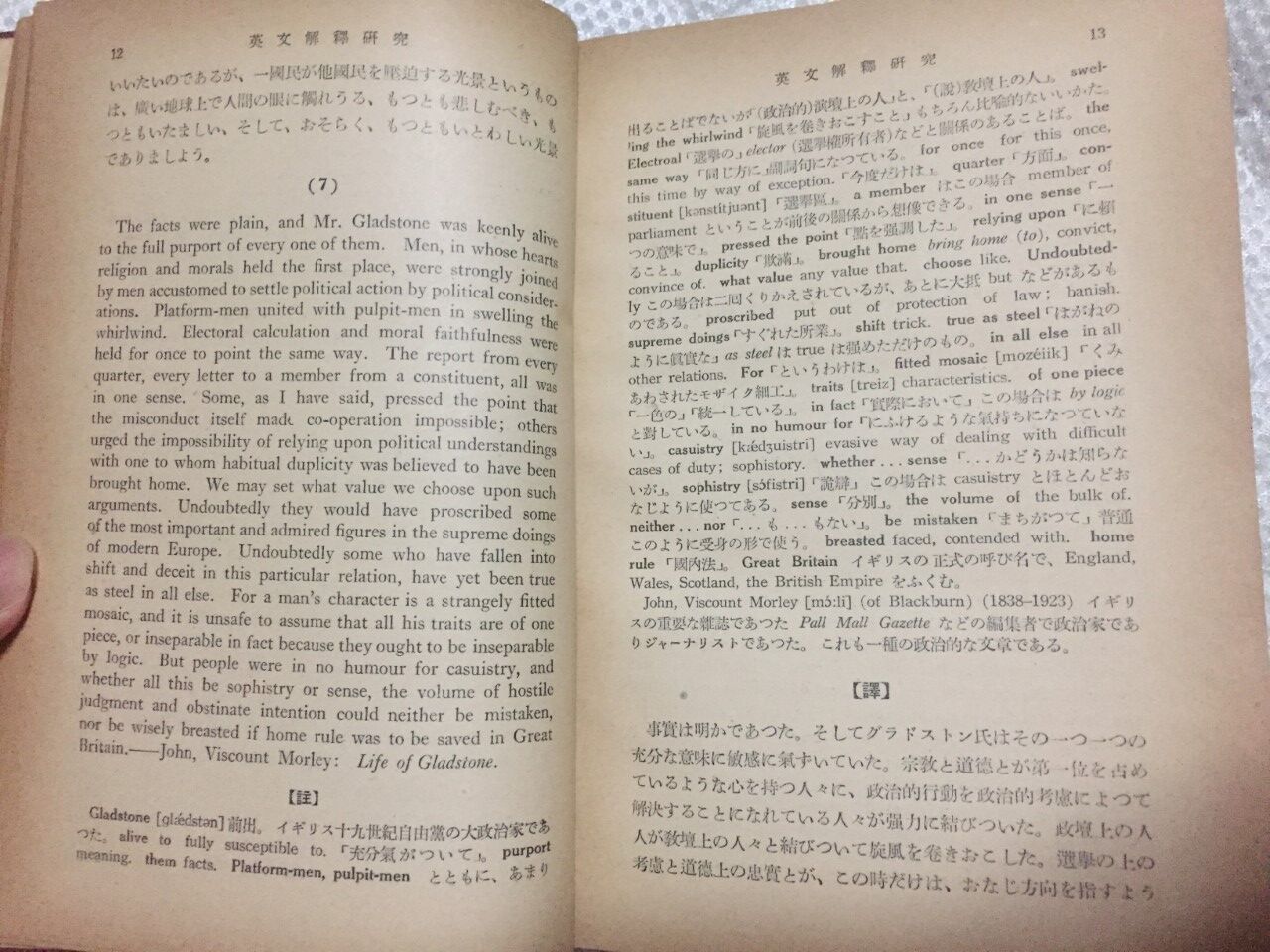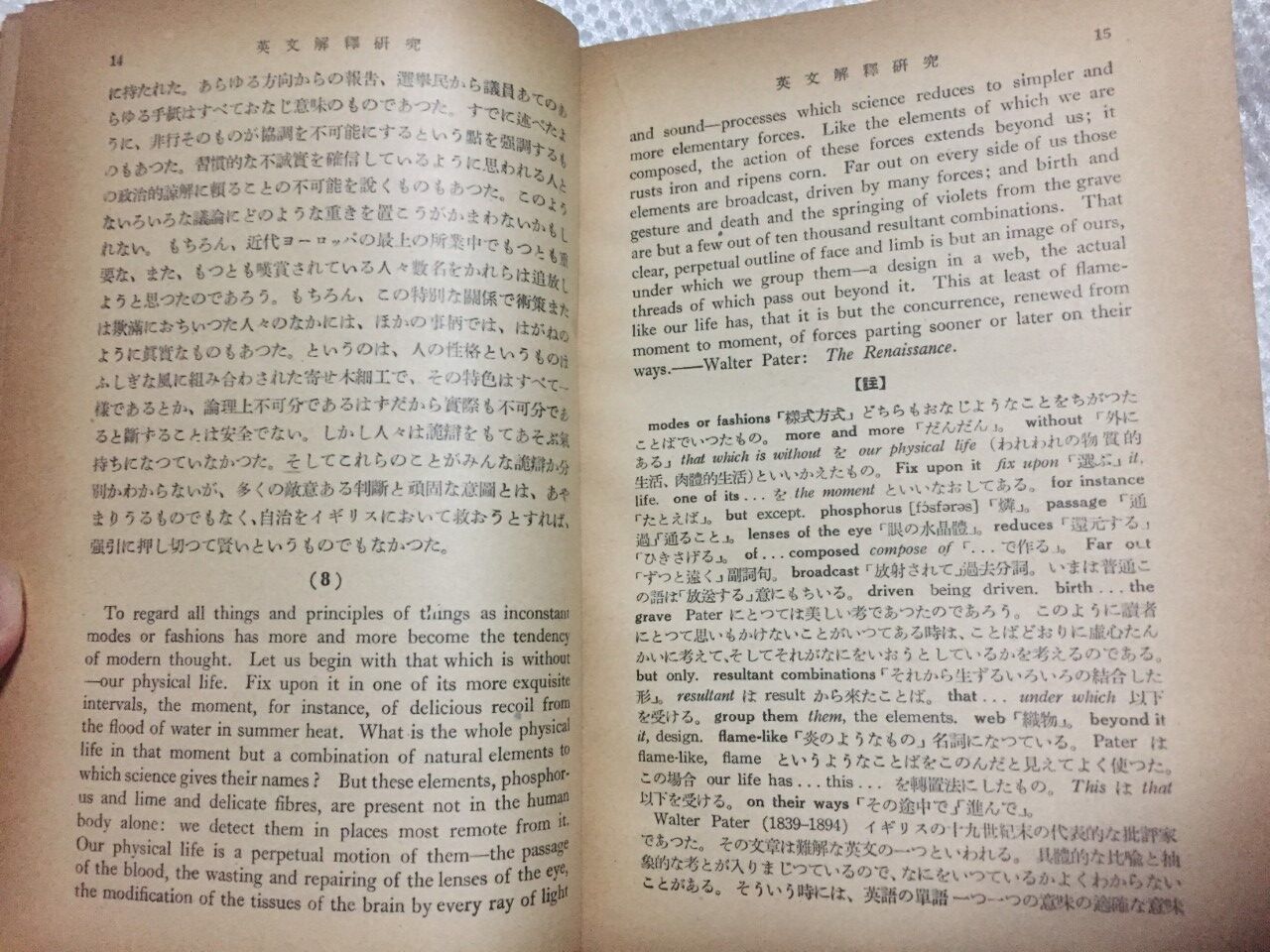高等英文解釋研究 第7問


19世紀アイルランドの大物政治家チャールズ・スチュワート・パーネルは、長年の不倫がスキャンダルとして取り沙汰されたことで、議会のみならずカソリック教会からも猛批判を受けることとなった、という内容。なのですが、本文はごく抽象的にしか書かれていないので、初見では英文はおろか、訳文を読んでもさっぱりわかりませんでした。
パーネルという政治家の不倫が問題になっているらしいということは、ネット上で原文を探して初めてわかりました。19世紀の貞操観念は今より遥かに厳格なものだったでしょうし、今回ばかりは議会と教会が軌を一にした理由も納得できます。
One of those events now occurred that with their stern irony so mock the statesman's foresight, and shatter political designs in their most prosperous hour. As a mightier figure than Mr. Parnell remorsefully said on a grander stage, a hundred years before, cases sometimes befall in the history of nations where private fault is public disaster.
At the end of 1889, the Irish leader had been made a party in a suit for divorce.引用:https://www.gutenberg.org/files/31711/31711-h/31711-h.html
Wikipediaではパーネルの不倫の顛末が詳しく紹介されています。
パーネルは長年同僚の議員ウィリー・オシェアの妻であるキャサリーン・オシェアと共に暮らしており、彼女との間には3人もの子供さえいた。キャサリーンとウィリーは財産問題のもつれから正式に離婚していなかったため、パーネルの政敵は彼女をキティー(売春婦の意)・オシェアと呼び、パーネルの辞任を要求した。パーネルが彼女と事実上結婚していることは議員の間では広く知られていたが、問題が高まるにつれ、それまで盟友の関係にあったグラッドストンもパーネルがアイルランド議会党の党首にいる間はその支援を行わないと声明することになった。
パーネルは辞任を拒否、党の会合において「誰がこの党の党首であるのか」と支持を呼びかけた。それに対しヒーリーからは「それではこの党の情婦は誰か」との声が挙がった。党は2つに分裂し、アイルランドの改革も一時的に後退することになった。
最終的にパーネルは党首を辞任させられますが、政界復帰を諦めず精力的に演説活動を行い、不倫相手のキャサリーン・オシェアとも結婚を果たします。ところがその努力が仇となったか、演説中の雨が原因で肺炎にかかり、程なくして帰らぬ人となってしまいます。
***
英文解釈という点では、文脈を把握した上でも理解できない箇所がいくつもあり、かなりの難問でした。
(1) "one to whom habitual duplicity was believed to have been brought home."
まず、この "brought home" をどう解釈すべきかわかりませんでした。模範訳には「習慣的な不誠実を確信しているように思われる人」とありますが、日本語として成立していないと感じるのは私だけでしょうか。
bring home は「~を痛感させる」「~をはっきりと分からせる」などが定訳ですが、それをこの英文に機械的に当てはめると以下のような訳文になります:
「習慣的な不誠実を痛感させられたと信じられている人」
しかし、不誠実を痛感させられたとはどういうことでしょう。不倫という不誠実な行為の重大さ、深刻さを実感させられたということ?
文全体で解釈すると「習慣的な不誠実の深刻さを実感させられた人と一緒に政治をやることはできないと批判する向きもあった」くらいの意味になるかと思います。("others urged the impossibility of relying upon political understandings with one to whom habitual duplicity was believed to have been brought home.")
しかし、「深刻さを実感させられたこと」が一緒に協力できない理由になるというのは何かおかしいですよね。いまいちピンときません。
そこで辞書を確認してみると、「(人)が犯したと立証する」という第二の定義を発見しました。
bring ~ home to someone
1.(人)に~を痛感させる、(人)に~をはっきりと認識させる、はっきり[切実に]悟らせる、徹底させる、しみじみ[痛切に]感じさせる、なるほどと思わせる、十分納得させる、十分思い知らせる、切実に理解させる、深く悟らせる、思い出させる2.〔罪などに関して〕(人)が犯したと立証する、(人)に承服させる、(人)に責任を負わせる
引用:https://eow.alc.co.jp/search?q=bring+home
to prove one's guilt―bring a charge home to a person
引用:https://ejje.weblio.jp/content/bring+a+charge
a. to make clear to
b. to place the blame on引用:https://www.collinsdictionary.com/dictionary/english/bring-home-to
こちらの定義で訳してみると、非常に納得できる文になります:
「習慣的な不誠実が立証されたと信じられているところの彼」
不誠実が立証されたのだから一緒に協力できない、というのは筋の通った主張に感じられます。実際、パーネルは不倫による離婚訴訟を起こされているので「不誠実が立証された」という表現は文脈的にも符合すると思います。
また、アガサ・クリスティーの翻訳でもこの第二の定義で "brought home" が訳されていることが確認できます。
However that may be, it was his genius that discovered the truth of the affair. But for Hercule Poirot I doubt if the crime would have been brought home to its perpetrator.
引用:https://readli.net/chitat-online/?b=117077&pg=1
それはそうかも知れないが、事件の真相を明らかにしたのは彼の天才によるもので丶もしポワロがいなかったら、果たして犯人をつきとめることができたかどうかは疑問である。
確認のためネイティブに尋ねてみましたが、興味深いことに第一義を採用する人もいれば、第二義で解釈する人もいました。 以下は、第一義の「痛感させる」という意味で解釈したネイティブの意見です:
"To bring (something) home" means to realize how real or serious something is. You may have been thinking of something as a distant, theoretical or abstract subject, but then something happens that makes you realize how serious and real it is.
Your quotation says that many people realized that Gladstone was frequently dishonest and that situation made working with him difficult. (*Gladstone ではなく Parnell)
I think his followers just chose to ignore the problem until they were faced with the prospect of trying to make political decisions with someone who was so duplicitous. When faced with this possibility, the problem was brought home. The duplicity, which was was previously remote and people chose to ignore it, was suddenly something that they had to face. It had been brought home.
I don't think that habitual duplicity was brought home to Parnell because Parnell was the habitually duplicitous person. The phrase "brought home" means to make something obvious or to make the theoretical real.
The habitual duplicity was brought home, with home being the world that these people lived and worked in. Maybe the writer means that the habitual duplicity had become something that Parnell could no longer escape, but that interpretation seems very odd.
このネイティブはまず "bring (someone) home" の意味を以下のように定義しています:
自分から遠く離れたものに感じられたり、仮定の話や抽象的な話だと思っていたことが、あることを境に深刻で現実的なものに感じられること。
その上で、パーネルの不誠実を痛感させられたのはパーネル自身ではなく、人々や他の政治家たちだと言っています。彼らはパーネルの不誠実を意図的に無視し続けてきたが、その不誠実に直面せざるをえない時が来た。従って彼らが "brought home" された、と。
パーネル自身は不誠実の常習犯なので、不誠実を痛感させられることはない。もしかしたら「習慣的な不誠実はもはやパーネルにとって逃れられないものになった」という意味かも知れないが、その解釈はかなり奇妙だ。
と、このネイティブは解釈しているようです。
しかし、原文には "one to whom ... brought home" とあるので、この解釈は文法を逸脱していますよね。to がなければあり得たかもしれませんが、文法的には "brought home" されたのは明らかにパーネルのはずです。少々アクロバティックな解釈のような気がします。
一方こちらは、第二義((人)が犯したと立証する)で解釈したネイティブの意見です:
It would appear to be definition 2. Parnell had been shown to be guilty of 'habitual duplicity', presumably because he had kept his relationship with Kitty O'Shea secret for a long time, as described in the Wikipedia article. Other politicians considered that they couldn't trust him politically if he had shown himself to be untrustworthy in his private life.
This seems to me to fit in with the general sense of the paragraph, more than Parnell being 'made aware' of his duplicity.
ざっくりと言えば、パーネルは「習慣的な不誠実」という罪を犯したと立証された。それに対して他の政治家たちは、パーネルが私生活で信用ならないことが示されたならば、政治的にも信頼することはできないと見なした。 この解釈のほうが、「パーネルが自身の不誠実を痛感させられた」という解釈より文脈に合っている。
という意見のようです。
この方の解釈は、上に書いた「不倫が立証されたのだから一緒に協力できない」という私の解釈とも一致しますね。また、この2人のネイティブは解釈を異にしているにも関わらず、「パーネルが自身の不誠実を痛感させられた」という解釈を否定している点では一致しているのは興味深いです。
たった二人に尋ねただけで結論を出すのは早計かもしれませんが、あくまで私の暫定的な結論としては、第二義で解釈したネイティブの意見に一票投じたいと思います。もし「それは違うんじゃない?」という意見がありましたら大歓迎です。
追記:ChatGPTに聞いてみました。ChatGPTも第二義で解釈しているようです。
"Brought home" in this context means that it is believed to be a fact or established truth that the person in question has a habit of duplicity or deceitfulness. It is something that is believed to be firmly established and not open to doubt.
(2) "Undoubtedly they would have proscribed some of the most important and admired figures in the supreme doings of modern Europe."
模範訳「もちろん、近代ヨーロッパの最上の所業中で最も重要な、また、もっとも嘆賞されている人々数名を彼らは追放しようと思ったのだろう」
次は、この文の "would have" をどう捉えるべきかわかりませんでした。模範訳では「思ったのだろう」と訳されていますが、これもよくわからない。普通に考えれば仮定法現在完了と捉えて、「彼らは追放していたのだろう(実際はそうではなかったが)」と読むのでしょうが、それだと文脈的に何を言いたいのかはっきりしません。
何はともあれ、まずは文脈を確認したいと思います。
まず文章の前半部は、政治と宗教が一丸となってパーネルを批判したという内容ですね。
続いて筆者は
"We may set what value we choose upon such arguments."
と述べ、「批判に対してどのような価値を見出すかは自由だ」と中立的な見方を示します。
そして今問題となっている "Undoubtedly..." から始まる文が2つ続くわけですが、その後の一文では「しかし人々は詭弁をもてあそぶ気にはなれなかった」と言っているので、どうやらこの2文は詭弁の例であるらしいということが窺えます:
"But people were in no humour for casuistry ..."
以上を簡単にまとめるとこうなります:
パーネルに対する批判
↓
こうした批判に対してどのように考えるのも自由
↓
批判に対して否定的な意見(詭弁)を2つ紹介
↓
しかし人々は詭弁をもてあそぶ余裕はなかった(それほど一丸となってパーネルを批判していた)
実際、2つ目の "Undoubtedly..." から始まる文はいかにも詭弁らしく聞こえます。私にはこのように聞こえました:
「人間というのは単純ではなく、一つ間違えたとしても他の部分では全く正しいということがありうる(だからパーネルを許そう)」
ならば、1つ目の "Undoubtedly..." から始まる文もやはり詭弁のはずです。ところが、"would have" を仮定法現在完了と捉えて読むと以下のようになりますが、どこが詭弁なのかはっきりしません:
「もちろん、近代ヨーロッパの最上の所業中で最も重要な、また、もっとも嘆賞されている人々数名を彼らは追放していただろう(実際は違ったが)」
「こんなに素晴らしい政治家たちを不倫のような些末事で追放しようとするのはけしからん」といった風に、政治家としての業績を盾にして不倫を矮小化しようとするなら詭弁と言えるでしょうが、そのような解釈は難しいように思うのですが、いかがでしょうか。
例によってネイティブに尋ねてみたところ、 "would have" の解釈は2つに分かれました。「仮定法現在完了」と「未来完了形 will have の過去形」という解釈です。
以下は、前者の仮定法現在完了で解釈したネイティブの意見です。
IF the cautions of those who oppose political understandings with liars and those who engaged in misconduct were heeded, THEN there would have been no agreements with some of the most impressive players in modern Europe. What is not said but understood is that these people - “important and admired figures “ - were obviously NOT excluded from “the supreme doings of modern Europe.”
My view is that the writer is simply stating two possible opinions after the two “undoubtedly” references without making a judgment (“whether this be sophistry or common sense”).
(It is possible that “casuistry” refers only to the second case, mainly because of the “unsafe to assume” phrase might lend itself to classical “casuistry” analysis. But frankly, that’s way beyond my level of expertise, so take it with a grain of salt.)
この方の解釈によれば、「嘘つきや不祥事に手を染めた者たちとの政治的合意に反対する者たちの警告が聞き入れられていれば、近代ヨーロッパで最も優れた政治家の何人かとの合意はなかっただろう(実際は合意があった)」といった意味になるようです。
ちょっと気になるのは、"liars and those who engaged in misconduct"と複数形が使われていることです。文章中では嘘つき(habitual duplicity)も不祥事(the misconduct)もパーネルただ一人を指しているので、本来複数形はおかしいはずですが、パーネル以外の嘘つきや不祥事も含めて考えている?また政治的合意についても、パーネルは最終的に辞任させられたので、合意があったとは思えません。
そして詭弁か否かという点については、“undoubtedly”から始まる2文は、詭弁だとかそういう意味合いはなく、単にあり得る意見を述べているに過ぎない、と言っています。
また、2つ目の文だけは詭弁の例かもしれないとも言っています。というのも、 “unsafe to assume”というフレーズが古典的な詭弁分析(?)に適しているからだそうです(古典的な詭弁分析とは何なのかよくわからないのですが、もしかしたら詭弁ではなく決疑論のことを指している?一応質問したのですが回答はもらえませんでした。)「私の専門レベルを大きく超えている」とも述べているので、ネイティブにとってもこの文章は難解なようです。
さて、もう1人のネイティブは、"would have" を未来完了形の過去形だと解釈していました。
You have been trapped into thinking that "would have" only applies to a main clause which is used with a conditional (if) clause in the past perfect. It can also be used as the past tense form of "will have".
未来完了の過去形で訳すと、以下のようになるかと思います(間違っていたら教えてください):
「もちろん、近代ヨーロッパの最上の所業中で最も重要な、また、もっとも嘆賞されている人々数名を彼らは(当時から見てある未来の時点で)追放してしまうことになっていただろう」
この解釈だと、「こんなに優秀な政治家が不倫のような瑣末事で追放されることになってしまったのは、けしからん」という詭弁として捉えることもできなくはない気がします。このネイティブにも詭弁かどうか尋ねてみましたが、難しすぎると匙を投げられてしまいました。
"Casuistry" is defined as "the clever use of arguments to persuade or trick people".But reading through the text you gave, I'm afraid that the sentence "Undoubtedly they would have proscribed ------ is totally meaningless to me. So, I cannot say whether or not it comes within the definition of "Casuistry".So, again, I'm sorry, it's totally beyond me.
この問題は結局よくわからないということで、保留としておきます。
追記:ChatGPTに聞いてみました。どちらの"Undoubtedly"も詭弁として見ることができるとのことです。
Yes, your suspicion is correct. The two sentences you mentioned can be seen as examples of casuistry, which is the use of clever but unsound reasoning, especially in moral issues, to defend or justify a position or action.
"Undoubtedly they would have proscribed some of the most important and admired figures in the supreme doings of modern Europe." This sentence suggests that if people were to apply the same standards of judgment universally, some other prominent figures who were admired for their achievements might also be condemned or excluded due to their misconduct. It's an attempt to create a moral equivalence, implying that since others with flaws are not rejected, Parnell's actions should be treated similarly.
"Undoubtedly some who have fallen into shift and deceit in this particular relation, have yet been true as steel in all else. For a man's character is a strangely fitted mosaic, and it is unsafe to assume that all his traits are of one piece, or inseparable in fact because they ought to be inseparable by logic." This sentence uses a sophisticated argument to suggest that although Parnell may have been deceitful in this particular situation (the adultery scandal), it doesn't mean that he lacked integrity in all aspects of life. It presents the idea that character is complex and multifaceted, so one should not judge an individual solely based on a single flaw.
However, in the context of the passage, it's clear that these arguments were not well-received or persuasive because "people were in no humour for casuistry." The public was not inclined to engage in nuanced discussions about character or moral relativism when it came to the adultery scandal involving Parnell, and the prevailing sentiment was against him, leading to a significant backlash.
興味深いのが1つ目の"Undoubtedly"の文の解釈です。ChatGPTはこの文を次のように解釈しています。
"Undoubtedly they would have proscribed some of the most important and admired figures in the supreme doings of modern Europe."
「(もし人々が誰に対しても同じジャッジを下していたら、パーネル以外の)近代ヨーロッパの最上の所業中で最も重要な、また、もっとも嘆賞されている人々のいくらかを彼らは追放していただろう(実際は追放されなかった)」
詳しく言えばこういうことになると思います。
「パーネル以外にも悪いことをしている議員はいる。もしパーネルに下されたジャッジと同じ基準が他の議員にも適用されたら、彼らもパーネル同様に追放されていたはずだ。しかしそうはなっていない、だからパーネルだけ厳しく扱われるのは不公平だ」
これはまさに詭弁と呼べると思います。ちょっと補った部分が多すぎてごたついてる感はあり、シンプルさでは「未来完了の過去形」説には劣りますが、文脈には完璧に沿っていて、有力な候補と言えそうです。
(3) Undoubtedly some who have fallen into shift and deceit in this particular relation, have yet been true as steel in all else.
最後は、この "relation" の意味についてです。模範訳では「この特別な関係」と直訳されていますが、意味がわかりません。ネイティブに尋ねたところ、これは relation の古い用法で、"event" や "incident" という意味だそうです。ただし、辞書を調べても載っていないので、どの辞書に載っているか尋ねたのですが、回答はもらえませんでした。
"in this event" "in this incident"
Wow, what a difficult text!
/edit to elaborate slightly, this is an older meaning of the world 'relation' and is not really used often any more.